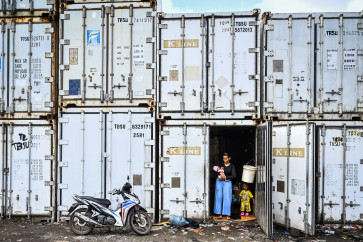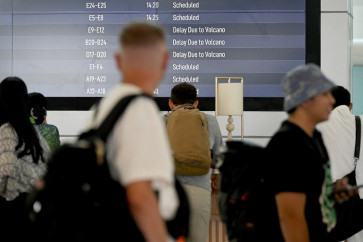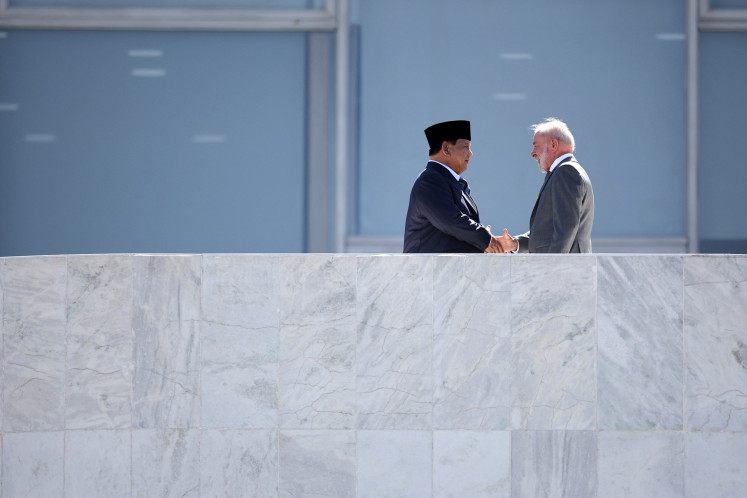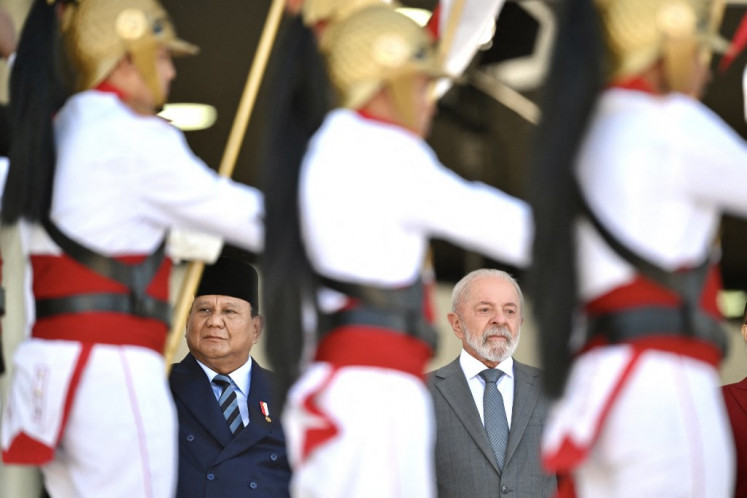Popular Reads
Top Results
Can't find what you're looking for?
View all search resultsPopular Reads
Top Results
Can't find what you're looking for?
View all search resultsIslamic hard-liners may be potential voters
As pollsters predict a grim outlook for Islamic parties in the 2014 legislative election, some parties are making an effort to appeal to fringe Muslim groups in the country
Change text size
Gift Premium Articles
to Anyone
A
s pollsters predict a grim outlook for Islamic parties in the 2014 legislative election, some parties are making an effort to appeal to fringe Muslim groups in the country.
The United Development Party (PPP) recently decided to nominate Munarman, controversial spokesman of the vigilante Islam Defenders Front (FPI), as one of its legislative candidates.
In February, PPP chairman Suryadharma Ali, who is also the religious affairs minister, went so far as to announce that his party was open to members of the Islamic Dakwah Indonesia Institution (LDII) and the Al-Zaytun boarding school, two institutions that are seen by many as radical.
The party’s goal was to translate Islamic principles into an Islamic constitution, PPP secretary-general M. Romahurmuziy said.
“Therefore, for instance, we do not accept non-Muslim legislative candidates,” he told The Jakarta Post on Tuesday.
He admitted that the presence of prominent Muslim figures would enhance the electability of Muslim-based parties.
“If we shift to the center or to the left, people will perceive us as inconsistent in upholding our values,” he said. “And, if they [the fundamentalist groups] have no place to channel their aspirations, they will become more savage.”
He later criticized pollsters for being “premature in assuming Islamic parties face a bleak future”.
He said that although Islamic parties had seen their support fluctuate, an average of 30 percent of the country’s voters would be ready to vote for them in an election.
In 1999, Islamic parties collectively won around 36 percent of the vote. They obtained 38 percent in 2004, and 25 percent during the 2009 election.
Political analyst Arie Sujito from Yogyakarta-based Gadjah Mada University (UGM), however, said it would not be easy for Islamic parties to win votes from hard-line groups.
“It’s a political strategy, but these Islamic parties must realize it won’t be easy to win votes from hard-liners as corruption has damaged their credibility,” he said.
Ary said that when it came to corruption, both secular and Muslim-based parties were in the same quandary.
He said that some parties, like the Prosperous Justice Party (PKS), were aware of the difficulties in shifting completely to become fundamentalist parties.
“They are trying to build an Islamic image while at the same time launching pragmatic programs. For instance, the party [PKS] once declared itself an open party at a meeting in Bali [in 2008],” he said.
Senior PKS politician Hidayat Nur Wahid had earlier said that the party would now focus on improving the party’s image following the arrest of former chairman Luthfi.
However, the party has also made overtures to some of the country’s hard-line groups.
The PKS is now leaning toward conservative Islamic groups in the ongoing deliberations of the Mass Organizations Bill, a move interpreted as an attempt to attract new voters.
The PKS said that the current draft of the bill needed amending to better protect Muslim organizations in the country and to lessen the influence of foreign groups and their local affiliates.
Not all Muslim parties are attempting to make themselves more attractive to fringe groups, however.
The National Mandate Party (PAN), which is affiliated with the country’s second-largest Islamic organization, Muhammadiyah, said it planned to be more inclusive to get more voters in the 2014 political campaign season. The National Awakening Party (PKB), which is connected with the country’s largest Islamic organization, Nahdlatul Ulama, has also said it aimed to increase the number of its non-Muslim members.
PAN central board member Bima Arya Sugiarto said his party would only focus on promoting the ideas of its chairman, Coordinating Economic Minister Hatta Rajasa.
“He has good ideas that we believe can reach all elements of society; perhaps even the fundamentalists,” he said.










